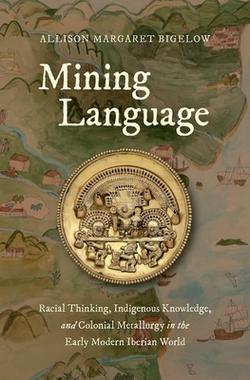
Allison Bigelow
Ph.D., English & Comparative Literature, UNC (2012)
M.A., English & Comparative Literature, UNC (2007)
B.A., Spanish Language & Literature, UMD (2003)
B.A., English Language & Literature, UMD (2003)
Allison Bigelow teaches colonial Latin American literature in the Department of Spanish, Italian, and Portuguese. She is interested in the intersections of colonial scientific discourse, translation, gender systems, and indigenous literacies, the four cardinal points of her book project. As part of a two-year NEH fellowship at the Omohundro Institute of Early American History and Culture, she worked on that manuscript, tentatively titled Cultural Touchstones: Mining, Refining, and the Languages of Empire in the Early Americas. The book traces overlaps and divergences in indigenous and European imperial mining and metallurgical systems and lexicons in the early Americas, with chapters on gold, silver, copper, and iron in the Inca, Mexica, Spanish, and English empires. The idea first came to her while teaching English in the Cerro Colorado copper mine (Chile, I Región), and research for the project has since taken her to the national archives and libraries of Bolivia, Cuba, England, Peru, and Spain, and she has enjoyed research fellowships at the Center for Southwest Research, Huntington Library, and John Carter Brown Library. As a graduate student, she served as resident co-director of UNC’s semester-long exchange program at La Universidad de la Habana, and she completed all three levels of the Duke/UNC Maya Summer Institute in Mérida, Yucatán. Here at UVa, she is excited to teach surveys of colonial Latin American literature (SPAN 3420, Fall 2014 and Spring 2015), seminars on colonial translation (SPAN 4500, Fall 2014), and graduate courses on colonial scientific literatures (SPAN 7800, Spring 2015).
Books:
Cultural Touchstones: Mining, Refining, and the Languages of Empire in the Early Americas (in progress, committed to the Omohundro Institute of Early American History and Culture/University of North Carolina Press)
Articles and Book Chapters:
“Gendered Language and the Science of Colonial Silk.” Early American Literature 49.2 (Summer 2014): 271-325.
“Mining the Languages of Empire in the Early Americas.” The Appendix 2.1 (2014): 14-21. http://theappendix.net/issues/2014/1/mining-the-languages-of-empire-in-the-early-americas.
“Lost in Translation: Knowledge Transfers and Cultural Divergences in Early Modern Spanish and English Silver Treatises.” Moneta, ed. Georges Depeyerot, Catherine Brégianni, and Marina Kovalchuk (Wetteren, Belgium: Agence Nationale de la Recherche-Dépréciation de l’Argent Monétaire et Relations Intérnationales, 2013): 237-260.
“La técnica de la colaboración: redes científicas e intercambios culturales de la minería y metalurgía colonial altoperuana.” Anuario de estudios bolivianos 18 (2012): 53-77.
“Colonial Industry and the Gendered Language of Empire: Silkworks in the Virginia Colony, 1607-1655.” European Empires in the American South, ed. Joseph P. Ward; aft. Kathleen DuVal (Oxford, M.S.: University of Mississippi Press, forthcoming, Spring 2016).
“Women, Men, and the Legal Languages of Mining in the Colonial Andes.” (9,000 words. Forthcoming from Ethnohistory, 2016.)
“The Translation of Earthly and Otherworldly Empires: Indigenous Interpreters, Missionary Linguists, and Universal Grammars in the Early Modern Atlantic World.” American Literature and the New Puritan Studies, ed. Carla Mulford and Bryce Traister (New York: Cambridge University Press. 6,200 words. Under review).
“Conchos, colores y castas de metales: El lenguaje de la ciencia colonial en la región andina.” Umbrales. (8,000 words; under review as of June 2015.)
